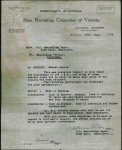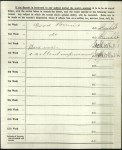SCHULTZ, Ernest Leslie
Ernest Leslie Schultz was born in Geelong on 9 March 1896. He was the eldest son of Ernest Schultz and his wife, Pauline (nee Hartwich). Ernest snr was an engineer with a special interest in developing a process of producing a cheap, fine grade motor oil from crude oil extracted from shale. He took out a patent in 1927 but a series of companies with which he was associated failed. He was thought to be a better inventor than business man.
The family moved to 124 Grey Street, East Melbourne, in 1909. The house was one of two matching, large, wooden, prefabricated houses erected on neighbourng blocks in 1853. Ernest Leslie was educated at Scotch College from 30 July 1912, and then followed his father into engineering, describing himself as engineer and dratsman when he enlisted on 26 July 1918.
He had had three years military experience serving with the Senior Cadets 64B, East Melbourne and continued to serve with the Citizens' Forces. Because of his German name he had to undergo investigation before his recruitment could be finalized two weeks later. References were sought and supplied from his teachers at Scotch College, the local vicar and the local police constable. He was appointed to the Recruit Depot Battalion at Broadmeadows on 23 September 1918. He never saw overseas service and was demobilized and discharged on 24 December 1918.
After discharge he returned to 124 Grey Street where his parents were still living and rejoined his father in the engineering business, as did his brother, Johann George, who also enlisted. On 12 September 1931 he married Doreen Joan Weld-Thomas at Holy Trinity, East Melbourne. They had moved to Sydney by 1939. He later changed his name to Sinclaire. He died in Sydney on 9 December 1973, aged 77, leaving his widow, Doreen, who died 14 January 2013, aged 101. They had no children.
Paul Mishura, Scotch College archivist: email 3 Sept 2015
Can you help?
Can you correct or provide more information about this person?
Or are you able to help with this history project?
- Family stories and records including photos, documents and memorabilia?
- Stories or information in books, newspapers and on-line?
- Memorial plaques in churches and public places?
- War memorial, church, national and state archives?
If so, please Contact the East Melbourne Historical Society.




